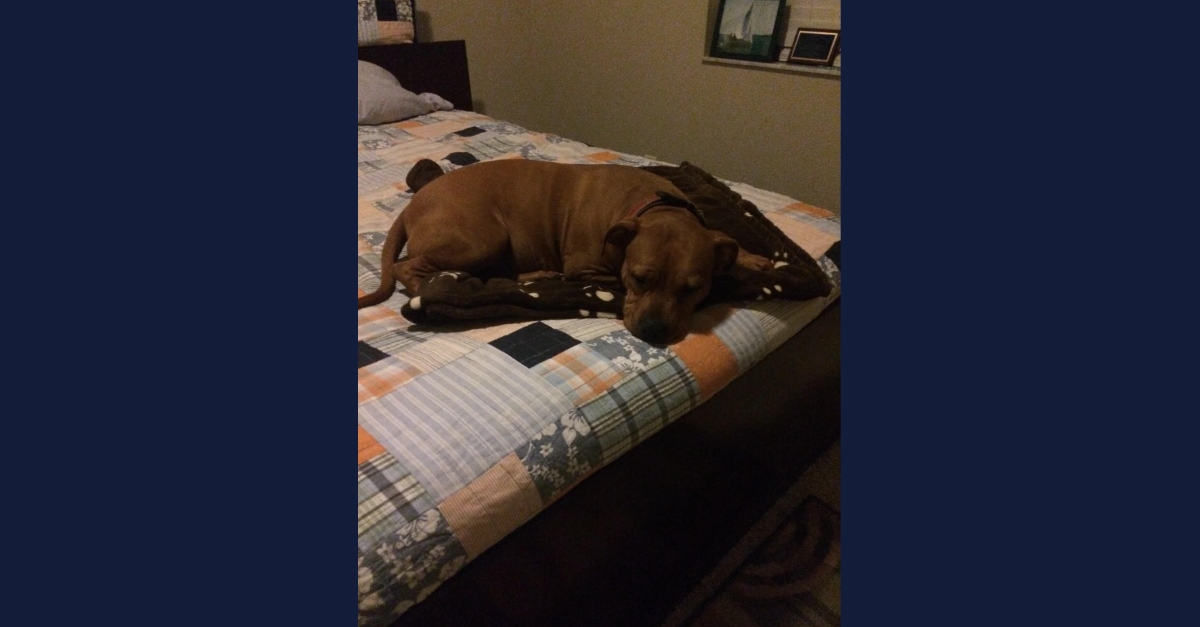
Candy
Jurors returned a verdict in favor of the defendant after a man shot and killed a beloved family dog. The plaintiff’s attorneys asked for $450,000 in damages.
The question before the panel was whether or not Zachary K. Deaterly acted in self-defense when he fatally injured the Staffordshire terrier mix Candy in a Nov. 16, 2016 confrontation. Jurors determined that he was justified in using self-defense.
The dog was out with her owner — the plaintiff Rodney M. Jacobson — on a 10-acre property in Sarasota County, Florida, where Jacobson kept his boat, according to the complaint. Zachary’s father Jeffrey Deaterly owned the land.
Jacobson maintained that Deaterly opened fire on Candy without provocation.
“Deaterly shouted obscenities with his gun still in his hand as Jacobson retrieved Candy and carried her gravely injured and bleeding to his truck in order to attempt to get her medical attention,” the complaint stated.
Candy died at a veterinarian’s office, the complaint said.
Jacobson attorney Matthew Tympanick told jurors during closing arguments that the plaintiff and the dog were at the location where the incident occurred to decorate for the Venice Boat Parade. He took issue with Deaterly referring to Candy as “it” during testimony.
“Candy was not an it. Candy was a she,” he said. “And she was Rod Jacobson and Sidney Watson’s dog before Zachary Deaterly killed her.”
“Candy was not an “it”, Candy was a she”: During closing arguments, plaintiff’s attorney referred to Zach Deaterly’s testimony about Candy the dog being an “it.” #CandyTheDog pic.twitter.com/RYlVlxCQvr
— Law&Crime Network (@LawCrimeNetwork) June 23, 2022
Deputies did not recommend charges in the shooting, but Jacobson filed suit.
Deaterly attorney Bryan Kessler, who often referred to Candy as “it,” maintained that the dog approached his client several times. Deaterly allegedly made several attempts to stop her. Deaterly yelled, stomped the ground, kicked dirt at the canine, and kicked the dog in the head, he said. This did not scare her away; rather, it only made her more angry, according to the defense. She allegedly lunged in and out at Deaterly multiple times as he yelled at Jacobson to do something to contain the dog.
Kessler highlighted testimony that Candy had specialized training, and could, on command sit, approach, or lay down. If the dog had such specialized training, he said, why didn’t Jacobson yell out to the dog?
He said that Candy weighed 60 pounds, was unleashed, and came from behind several bushes at the side of a shed on a densely wooded piece of property.
Tympanick denied any suggestion that Candy was aggressive. She had been on the Deaterly property numerous times and joined Jacobson on trips to job sites, he said. She never bit or jumped on anyone, he said.
“As Mr. Jacobson told you, the boat was her happy place,” he said. “Place where she felt safe.”
Amid the shooting, Jacobson heard a voice call out his name, the attorney said.
He saw Deaterly kick dirt at Candy, and he took a hold of the collar, Tympanick said.
“And as he’s doing that — because obviously he turned away to grab Candy — bullets start to fly,” he said.
Deaterly told law enforcement an initial account about not knowing if he struck anything, but testified about a different, more specific version of events in which he said he missed the first two times and struck Candy on the third, Tympanick. Candy did not bite or even get a paw on him, the attorney said.
“How is that self-defense?” he said. “How is it that a dog deserves to be shot simply for barking?”
[Image via Rodney Jacobson]